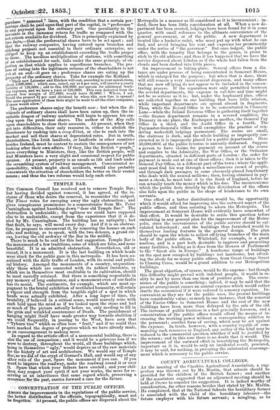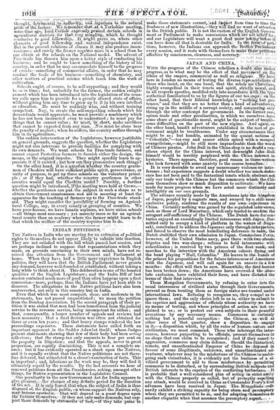COUNTY AGRICULTURAL COLLEGES.
Ar the meeting of the Cheshire Agricultural Association, a sug- gestion was thrown out by Mr. Martin, that schools should be provided for the children of the British farmer ; and another of the associators suggested that an adjourned meeting should be held at Crewe to consider the suggestion. It is indeed worthy of consideration, for other reasons besides that stated by Mr. Martin. He complained, that at the National Schools the hereditary farmer is associated with the child of the hereditary labourer—the future employer with his future servant; a mingling, as he
lure Tiled 14, ea
I I I I I
But in the present relations of classes it may also produce moon- Venience ; and surely the farmer requires more in a school than he can obtain at the schools on the :National model. The advent of Free-trade has thrown him upon a better style of conducting his business; and he ought to know something of the history of his country, in order that he may accommodate himself to the progress of events—something of commercial affairs, in order that he may conduct the trade of his business7-sometbing of chemistry, and other matters of practical science which teach him the work of cultivation.
Schools ought, of course, to be self-sUpporting ; and they would be so in time ; but, unluckily for the farmer, the sudden enlight- enment which has been introduced into the legislation of the coun- try calls upon him to provide for a greatly altered state of affairs, without giving him any time to grow up to it in his own intellect or education. He must be suddenly wise, and withOut training competent. Nay, to create the self-supporting schools which his descendants would appreciate,- he'must provide 'a machinery which he has not been instructed even to nratostand ; he must pay for things that he cannot value ; he must, Lfd short, make sacrifices that cannot be expected froin any man. ',tor must he alone bear
the penalty of neglect ; when he suffers, the suffers through him in its agriculture. The sudden intervention of the Legislature, however justifiable on general groimds, suggests the question, whether the Legislature might not also intervene to provide facilities for complying with its own demands. We want schools for Free-trade farmers, and cannot expect Protection farmers to furnish either the design, the means, or the original impulse. They might speedily learn to ap- preciate it if it existed ; but how can they preconceive such things ?
On the other hand, it is a question whether the country gentle- men of Cheshire will hare sufficient pnblic spirit, perieverance, or unity of purpose' to get up those schoolson the voluntary princi- ple ; or' if they had, whether the country gentlemen in other counties would equal the CheAtire model ? Possibly, a further question might be introducedarth4pAting were held at Crewe,— whether the gentlemen can put; the,anAject in such .a shape as to obtain Government cOuntenanee4nch aid in securing at least the apparatus for the teaching of farmersitp, to the Free-trade stand- ard. They might consider the .pos.sibility of forming an Agricul- tural College, say, in every county o}•, grouping of counties. We have poor-houses, we haVe lunatic asylmna, we have-union schools —all thingsMoat necessary ; yet. scarcely:more Bo for an agricul- tural-County than an academy where the fernier might learn to do that which the welfare of the cnnittrY-retitiiiies him to do.
. . . pride 'of the farmer. , p:rhnein same time ago, Lord Carlisle . agricultural:districts fur tha lye conducive to good fellowship, . elements of good fellowship
rtain schools in li he thought iprove so, where other na ural independence exist.



























 Previous page
Previous page